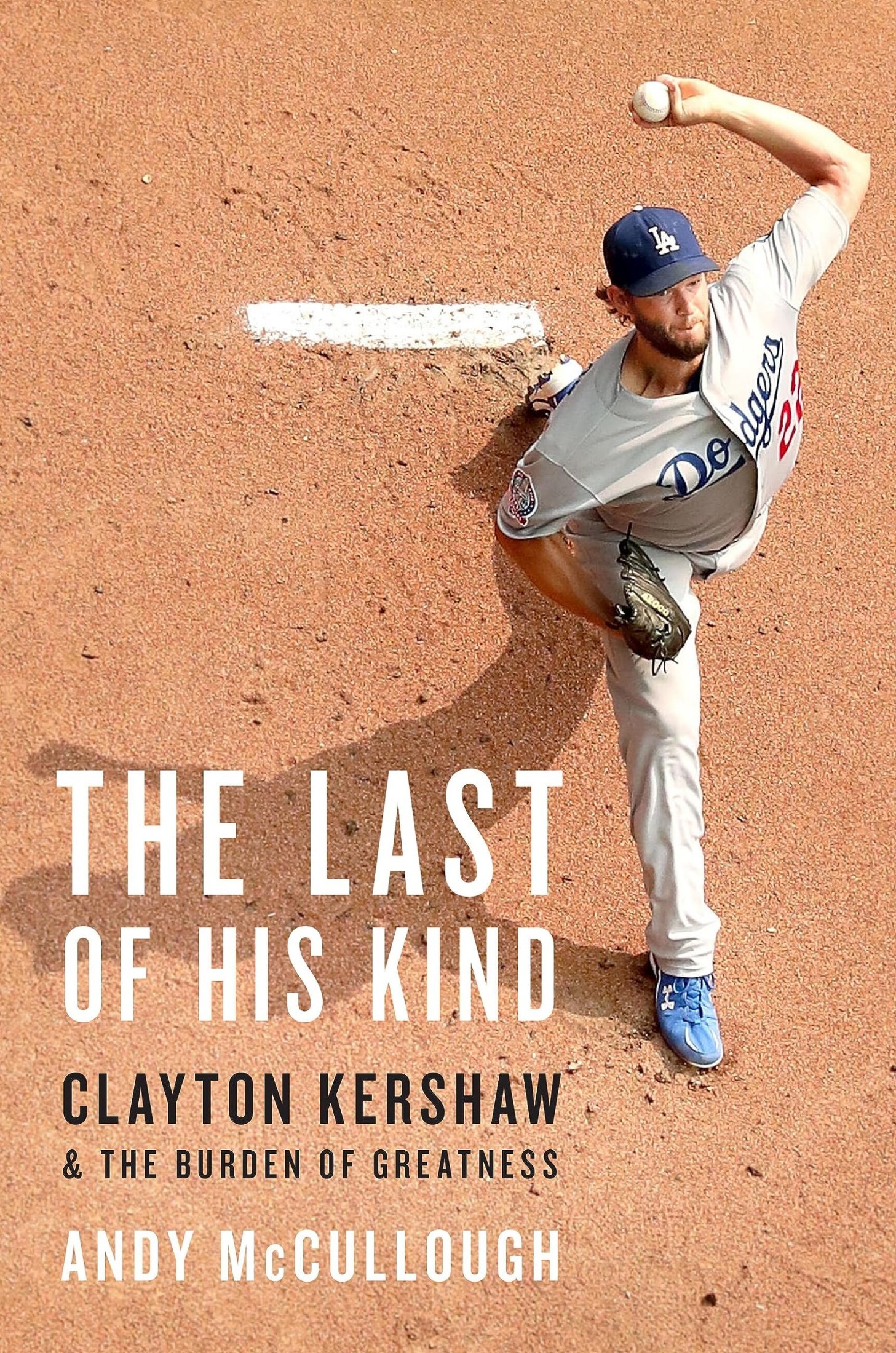Mr. Book just finished The Last of his Kind: Clayton Kershaw and the Burden of Greatness, by Andy McCullough.
Clayton Kershaw is one of the greatest pitchers of all time. He is a three-time National League Cy Young Award, 2014 National League MVP, has led the National League in ERA 5 times, is a 10-time All-Star and holds the Dodgers career strikeout record.
The author made a great point early on in the book, when talking about Kershaw’s injuries over the years, that “[s]ome of his ailments represented the natural result of a profession built around the unnatural act of repeatedly throwing a spherical object overhand” and a former teammate aid “It’s like a car crash every time he throws.” There is an irony about pitching. On the one hand, the ability for men to throw proved to be crucial in the evolution of the species, dating back to our days as hunter/gatherers. But, on the other hand, there is nothing natural about the motion of a pitcher’s arm and the strain that pitching puts on a pitcher’s body. There is no such thing as a completely healthy pitcher. Every pitcher on every team’s roster has endured enough trauma to the arm by the time he reaches the majors that any doctor can find something in the medical reports to fail him on medical grounds. It’s all a matter of how risk vs. reward that a team wants to take with that pitcher. And there are teams (one of which stands out most prominently) that has had reputations for using “medical reasons” as ways to back out of trades and free agent signings after getting buyer’s remorse before all of the paperwork was finalized to make the transaction official.
The amount of detail and the discussion of Kershaw’s routines on days in which he pitched were among the highlights of the book.
Kershaw insists that he has “no interest in being Sandy Koufax. And I don’t want to live up to that that.” Kershaw and Koufax don’t belong at the same level. Taking into account the offensive levels in which each of them competed, Kershaw is so far ahead of Koufax that it’s no contest. And that’s even before you factor in that Koufax had all of the mediocre years to his career before it changed (not coincidentally, but it was when the Dodgers moved into the very pitching friendly Dodger Stadium) while Kershaw has been pure dominance throughout his whole career.
The chapters on the year leading up to Kershaw being drafted by the Dodgers was excellent. It was also very interesting to see some of the players that Kershaw’s name came up in trade rumors while he was still a prospect.
One of the great things about baseball, and history, books is all of the great little tidbits that they always contain. One great example from this book was Kershaw turning down a $300 million contract in 2012–at a time in which they would have been the largest contract in sports history—since it would have been for 15 years. He later said, “I don’t ever want to commit to a contract that I don’t feel like I can give up my end of the bargain. And so fifteen years I just don’t feel was doable for me. It goes back to that anxiety. Having to commit to fifteen years of playing baseball? I just like that, ‘I don’t know if I’m going to be good. I don’t want to do this, if I’m not going to be good.”
I think that definitely becomes clear throughout the book is Kershaw’s stubbornness. The Dodgers insistence that he learns a changeup and them wanting him to throw his curve more often have been consistent themes of his career. Kershaw actually reminds me of pugs. And, let me emphasize that I mean it as a compliment whenever I compare someone to a pug. Pugs are incredibly stubborn dogs. Pugs don’t have ears: they have selective listening devices. A pug understands a LOT of English, but they just prefer to only listen to what they want to hear. As I say all of the time, “A pug does not listen to what a pug doesn’t want to hear.” A pug also has to make sure that they at least give off the appearance that it’s always their idea: no, I didn’t do what you asked, I did it because it was my idea. It is clear to me that Kershaw is just like a pug: he’ll eventually decide to listen, but it will take a long time and it had to be his idea to finally get on board.
The book did a very good job chronicling all of Kershaw’s postseason failures, leading up to their 2020 World Series title.
After finishing this book, I then got the audiobook version, so I will be able to enjoy it again.
I give this book an A+ and inducted it into the Hall of Fame. Goodreads requires grades on a 1-5 star system. In my personal conversion system, an A+ equates to 5 stars. (A or A+: 5 stars, B+: 4 stars, B: 3 stars, C: 2 stars, D or F: 1 star).
This review has been posted at my blog, Mr. Book’s Book Reviews, and Goodreads.
Mr. Book originally finished reading this on June 12, 2024.


